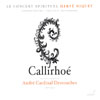Destouches Callirhoé
This forgotten Baroque favourite proves well worth disinterring
View record and artist detailsRecord and Artist Details
Composer or Director: André Cardinal Destouches
Genre:
Opera
Label: Glossa
Magazine Review Date: 13/2007
Media Format: CD or Download
Media Runtime: 100
Mastering:
Stereo
DDD
Catalogue Number: GCD921612

Tracks:
| Composition | Artist Credit |
|---|---|
| Callirhoé |
André Cardinal Destouches, Composer
(Le) Concert Spirituel Orchestra André Cardinal Destouches, Composer Cyril Auvity, Agenor, Tenor Hervé Niquet, Conductor Ingrid Perruche, La Reine, Soprano João Fernandes, Corésus, Bass Renaud Delaigue, Le Ministre, Bass Stéphanie d' Oustrac, Callirhoé, Mezzo soprano Stéphanie Revidat, Une bergere, Soprano Stéphanie Revidat, Princesse de Calydon, Soprano |
Author: Richard Wigmore
One-time soldier in the King’s Musketeers, pupil of Campra and a favourite of the ageing Louis XIV, André Cardinal Destouches (1672-1749) is today a shadowy, peripheral figure of the French Baroque. Enter the ever-enterprising Hervé Niquet to rehabilitate a composer admired for his melodic fertility, rich instrumentation and precise, vivid declamation. After leafing through Destouches’s 20 or so surviving operas, Niquet opted for this tragédie en musique, premiered in 1712, and revised and dramatically tightened for a 1743 revival – the version here.
Drawing on an ancient Greek legend, the plot centres on the confrontation between Princess Callirhoé of Calydon and Corésus, High Priest of Bacchus. When she rejects him in favour of the young warrior Agénor, Corésus calls on Bacchus to wreak havoc on all and sundry. An oracle pronounces that the god can only be appeased by a human sacrifice. After heroic gestures from Callirhoé and Agénor, the situation is finally saved by the penitent Corésus; the opera ends starkly, in bare recitative, with his suicide, a conclusion disconcerting to 1743 Parisian audiences, for whom a final ballet was virtually de rigueur.
Though it cannot match the best of Rameau, Callirhoé proves well worth disinterring. Destouches lives up to his reputation for inventive orchestration, whether in the exquisite mingling of flutes and violins in the Princess’s melancholy opening soliloquy, or the dark, hieratic colourings that accompany the oracle’s words. There are graceful and spirited divertissements (this being French Baroque opera, nymphs and shepherds are likely to frolic in at the slightest provocation), sonorous choruses, and several scenes of striking power.
Based on the 2006 production at the Opéra de Montpellier, this recording has the theatricality and spontaneity of a real, rather than studio-manufactured, performance. Niquet paces and shapes the opera with a natural feeling for the French Baroque idiom, so elusive to outsiders. Though I sometimes wished for a less emphatic, percussive continuo, the instrumental and choral contributions are first-rate. And while there are no outstanding voices among the young cast, all of them, especially Stéphanie d’Oustrac as an eloquent, impassioned Callirhoé, are dramatically convincing and sound thoroughly idiomatic in their declamation. Destouches’s opera may have its occasional dry stretches but there is plenty here to absorb and delight anyone with a taste for Lully or Rameau.
Drawing on an ancient Greek legend, the plot centres on the confrontation between Princess Callirhoé of Calydon and Corésus, High Priest of Bacchus. When she rejects him in favour of the young warrior Agénor, Corésus calls on Bacchus to wreak havoc on all and sundry. An oracle pronounces that the god can only be appeased by a human sacrifice. After heroic gestures from Callirhoé and Agénor, the situation is finally saved by the penitent Corésus; the opera ends starkly, in bare recitative, with his suicide, a conclusion disconcerting to 1743 Parisian audiences, for whom a final ballet was virtually de rigueur.
Though it cannot match the best of Rameau, Callirhoé proves well worth disinterring. Destouches lives up to his reputation for inventive orchestration, whether in the exquisite mingling of flutes and violins in the Princess’s melancholy opening soliloquy, or the dark, hieratic colourings that accompany the oracle’s words. There are graceful and spirited divertissements (this being French Baroque opera, nymphs and shepherds are likely to frolic in at the slightest provocation), sonorous choruses, and several scenes of striking power.
Based on the 2006 production at the Opéra de Montpellier, this recording has the theatricality and spontaneity of a real, rather than studio-manufactured, performance. Niquet paces and shapes the opera with a natural feeling for the French Baroque idiom, so elusive to outsiders. Though I sometimes wished for a less emphatic, percussive continuo, the instrumental and choral contributions are first-rate. And while there are no outstanding voices among the young cast, all of them, especially Stéphanie d’Oustrac as an eloquent, impassioned Callirhoé, are dramatically convincing and sound thoroughly idiomatic in their declamation. Destouches’s opera may have its occasional dry stretches but there is plenty here to absorb and delight anyone with a taste for Lully or Rameau.
Discover the world's largest classical music catalogue with Presto Music.

Gramophone Digital Club
- Digital Edition
- Digital Archive
- Reviews Database
- Full website access
From £8.75 / month
Subscribe
Gramophone Full Club
- Print Edition
- Digital Edition
- Digital Archive
- Reviews Database
- Full website access
From £11.00 / month
Subscribe
If you are a library, university or other organisation that would be interested in an institutional subscription to Gramophone please click here for further information.




